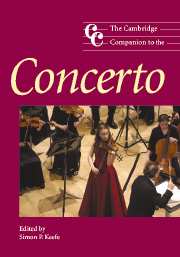Book contents
- Frontmatter
- Introduction
- Part I Contexts
- Part II The works
- 3 The Italian concerto in the late seventeenth and early eighteenth centuries
- 4 The concerto in northern Europe to c.1770
- 5 The concerto from Mozart to Beethoven: aesthetic and stylistic perspectives
- 6 The nineteenth-century piano concerto
- 7 Nineteenth-century concertos for strings and winds
- 8 Contrasts and common concerns in the concerto 1900–1945
- 9 The concerto since 1945
- Part III Performance
- Notes
- Selected further reading
- Index
9 - The concerto since 1945
from Part II - The works
Published online by Cambridge University Press: 28 September 2011
- Frontmatter
- Introduction
- Part I Contexts
- Part II The works
- 3 The Italian concerto in the late seventeenth and early eighteenth centuries
- 4 The concerto in northern Europe to c.1770
- 5 The concerto from Mozart to Beethoven: aesthetic and stylistic perspectives
- 6 The nineteenth-century piano concerto
- 7 Nineteenth-century concertos for strings and winds
- 8 Contrasts and common concerns in the concerto 1900–1945
- 9 The concerto since 1945
- Part III Performance
- Notes
- Selected further reading
- Index
Summary
The plain fact that works called ‘concerto’ continued to be composed after 1945 demonstrates the failure of twentieth-century avant-garde initiatives to create a totally new musical world whose qualities and characteristics could persuade the entire community of classical composers to adopt them. Historians of culture tend to acknowledge that the very notion of an avant-garde is only meaningful in a comparative context, requiring the survival of those allegedly exhausted, conservative values and procedures that radical progressives seek to supplant: and no credible cultural history of the years since 1900 can ignore the extraordinary diversity of stylistic and structural initiatives in composition – old, new, progressive, regressive – the most profound legacy of the Romantic and modernist individualism that formed the foundations of twentieth-century culture in the widest sense.
There would nevertheless have been little point in composers after 1945 producing concertos, or any other works in such well-established genres as symphony, opera or string quartet, if institutions suited to the regular presentation of such works had not survived, and continued to prosper. In the case of the concerto the insatiable desire among concert audiences and record buyers for brilliant soloistic display must always be matched by the enthusiasm of individual virtuosos for new challenges, and while very few if any professional solo performers since 1945 have been able to make a career exclusively from the promotion of the new and the unfamiliar, the continued prominence of the concerto owes much to the supreme gifts of artists like Mstislav Rostropovich and Heinz Holliger whose advocacy of the new gained credibility by way of their evident and equal mastery of the old.
- Type
- Chapter
- Information
- The Cambridge Companion to the Concerto , pp. 161 - 174Publisher: Cambridge University PressPrint publication year: 2005



